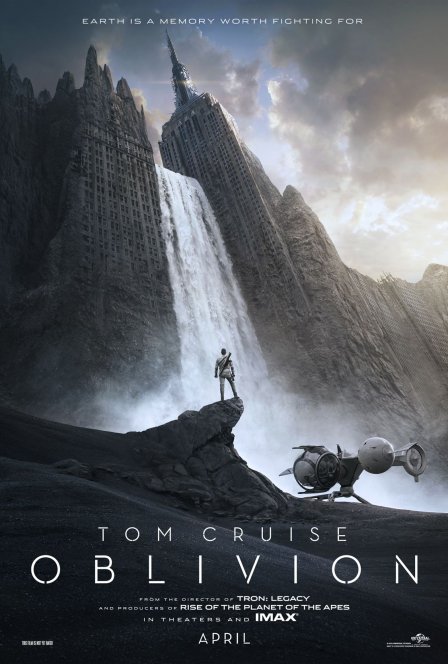Special effects and splendid visuals do not define the best science fiction films. The most gorgeous ones seem hollow without ideas behind them, and stripped-down, inexpensive ones can be upheld by their brainy thoughtfulness. Shane Carruth’s Primer was made for seven thousand dollars, for example, and The Man from Earth is compelling even if it amounts to little more than friends conversing in a living room. Oblivion, the new sci-fi film from Joseph Kosinski, first seems like glossy fun and little else. But while the CGI is austerely beautiful, underneath the top-notch production value is a story with intriguing ideas and a weirdly satisfying payoff. After fumbling with Tron: Legacy (TMT Review), Kosinski proves he’s the real deal.
It’s 2067, and Earth is a wasteland. A war with the scavengers (nicknamed “scavs”) resulted in the moon’s destruction, and since our planet couldn’t handle that kind lunar upheaval, super-storms then destroyed entire cities. The only ones left on the planet are Jack Harper (Tom Cruise) and Victoria (Andrea Riseborough), who are cleaning up the leftover scavs while the rest of Earth hang out on Saturn’s moon Titan (“We lost the planet but won the war” is a repeated line).
Jack’s more nostalgic about Earth than Victoria: while she sits in an elegant sky station, taking orders from Sally (Melissa Leo), Jack visits the ruins of football stadiums and tries to relive civilization’s glory days. With only two weeks left before leaving Earth, Jack intercepts a distress call from a ship that’s been floating through space for sixty years. He recognizes Julia (Olga Kurylenko), the ship’s only survivor, because she’s literally the women from his dreams. And when she regains consciousness, she calls Jack by his name. Their connection upends everything Jack understands about his world.
I wouldn’t say Kosinski outright steals from other science fiction films. His world is too stylized and unique for that. Instead, his film borrows tropes from the best of the genre, whether they’re highbrow or corny, and adjusts them so they conform to his vision. There’s a nod to Planet of the Apes when Beech (Morgan Freeman), a resistance leader, tells Jack he won’t necessarily like the answers he’s looking for. Julia’s stasis and subsequent recovery is straight out of Aliens. Despite all these references, Kosinski keeps it fresh (mostly) with thought-provoking plot twists. Unexpectedly, the script coalesces into a satisfying love triangle. Jack means different things to Victoria and Julia, and his significance to them shifts as the plot continues. By the time Kosinski wraps it up, he settles on a definitive theory of what it means to be human.
The dimensions of a typical movie theater are not enough for Oblivion, and a retina-bursting IMAX screen does the visuals a service. Kosinski does not include too many details, and prefers to construct a shot around a singular, striking image. The eye focuses on just one detail, constructing a visual metaphor for Jack’s gnawing loneliness. While he’s out on patrol, the landscapes look as if they’re sandblasted, and only husks of the biggest monuments remain. Jack does find reprieve in a forgotten valley, one that can still sustain life, yet they’re no match for an abandoned planet. M83 provides the background music, and their woozy synths shrewdly counteract the production design.
Tom Cruise is the sort of movie star who mustn’t ever share the limelight. His recent films have all been about him, and the relatively unrecognizable supporting cast is forced to bask in his ego (Freeman only appears in a handful of scenes). Cruise justifies his participation through effective, muscular performances. Jack does not need to be smart — we’re figuring out the puzzle along with him — but he does need to likable, and Kosinski accomplishes that by focusing on his character’s taciturn competence. Whether it’s a chase through cliffs or a gun battle with killer robots, Cruise sells the inherent silliness of the material. The two women do what they can with relatively simpler roles, yet they’re little more than targets for Jack’s emotion. Leo gives a more nuanced, deliberately sinister performance, even though her character is nothing more than a face on a screen.
Oblivion does not have the structure of a typical science fiction film. Jack’s discovery is continuous, so even late into the story there are still suspenseful moments where we ache to understand what exactly is happening. Sure, there are speedy action sequences where Kosinski can show off his kinetic inventiveness, but ultimately matters is how Jack comes to understand his place in the world. Earth may be a wasteland, but that’s nearly immaterial once there’s a mutual, deep connection with someone else. In a clever way, Kosinski finds a way to have this connection transcend death.

